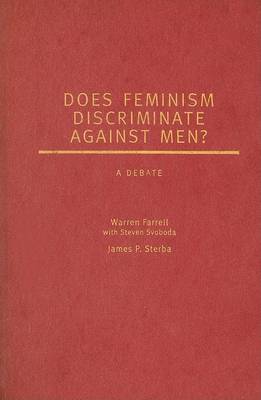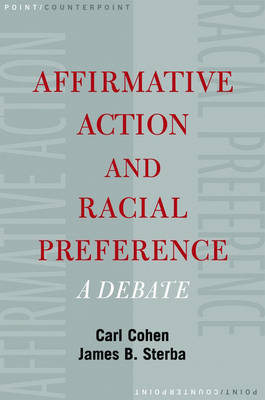Point/Counterpoint
2 total works
Does Feminism Discriminate Against Men?
by Warren Farrell and James P. Sterba
Published 10 October 2007
Does feminism give a much-needed voice to women in a patriarchal world? Or is the world not really patriarchal? Has feminism begun to level the playing field in a world in which women are more often paid less at work and abused at home? Or are women paid equally for the same work and not abused more at home? Does feminism support equality in education and in the military, or does it discriminate against men by ignoring such issues as male-only draft registration and boys lagging behind in school? The only book of its kind, this volume offers a sharp, lively, and provocative debate on the impact of feminism on men. Warren Farrell--an international best-selling author and leader in both the early women's and current men's movements--praises feminism for opening options for women but criticizes it for demonizing men, distorting data, and undervaluing the family. In response, James P. Sterba--an acclaimed philosopher and ardent advocate of feminism--maintains that the feminist movement gives a long-neglected voice to women in a male-dominated world and that men are not an oppressed gender in today's America.Their wide-ranging debate covers personal issues, from love, sex, dating, and rape to domestic violence, divorce, and child custody.
Farrell and Sterba also look through their contrasting lenses at systemic issues, from the school system to the criminal justice system; from the media to the military; and from health care to the workplace. A perfect book to get students thinking and debating, Does Feminism Discriminate Against Men? A Debate is ideal for courses in gender studies, sociology, psychology, economics, feminist philosophy, and contemporary moral issues. It is also compelling reading for anyone interested in the future of men and women.
Farrell and Sterba also look through their contrasting lenses at systemic issues, from the school system to the criminal justice system; from the media to the military; and from health care to the workplace. A perfect book to get students thinking and debating, Does Feminism Discriminate Against Men? A Debate is ideal for courses in gender studies, sociology, psychology, economics, feminist philosophy, and contemporary moral issues. It is also compelling reading for anyone interested in the future of men and women.
Affirmative Action and Racial Preferences
by Carl Cohen and James P. Sterba
Published 23 October 2003
Racial preferences are among the most contentious issues in our society, touching on fundamental questions of fairness and the proper role of racial categories in government action. Now two contemporary philosophers, in a lively debate, lay out the arguments on each side. Carl Cohen, a key figure in the University of Michigan Supreme Court cases, argues that racial preferences are morally wrong-forbidden by the 14th Amendment to the Constitution, and explicitly banned by the Civil Rights Act of 1964. He also contends that such preferences harm society in general, damage the universities that use them, and undermine the minorities they were intended to serve. James P. Sterba counters that, far from being banned by the Constitution and the civil rights acts, affirmative action is actually mandated by law in the pursuit of a society that is racially and sexually just. The same Congress that adopted the 14th Amendment, he notes, passed race-specific laws that extended aid to blacks.
Indeed, there are various kinds of affirmative action-compensation for past discrimination, remedial measures aimed at current discrimination, the guarantee of diversity-and Sterba reviews the Supreme Court cases that build a constitutional foundation for each. Affirmative action, he argues, favors qualified minority candidates, not unqualified ones. Both authors offer concluding comment on the University of Michigan cases decided in 2003. Half a century after Brown v. Board of Education, issues pertaining to racial discrimination continue to grip American society. This penetrating debate explores the philosophical and legal arguments on all sides of affirmative action, but also reveals the passions that drive the issue to the forefront of public life.
Indeed, there are various kinds of affirmative action-compensation for past discrimination, remedial measures aimed at current discrimination, the guarantee of diversity-and Sterba reviews the Supreme Court cases that build a constitutional foundation for each. Affirmative action, he argues, favors qualified minority candidates, not unqualified ones. Both authors offer concluding comment on the University of Michigan cases decided in 2003. Half a century after Brown v. Board of Education, issues pertaining to racial discrimination continue to grip American society. This penetrating debate explores the philosophical and legal arguments on all sides of affirmative action, but also reveals the passions that drive the issue to the forefront of public life.

